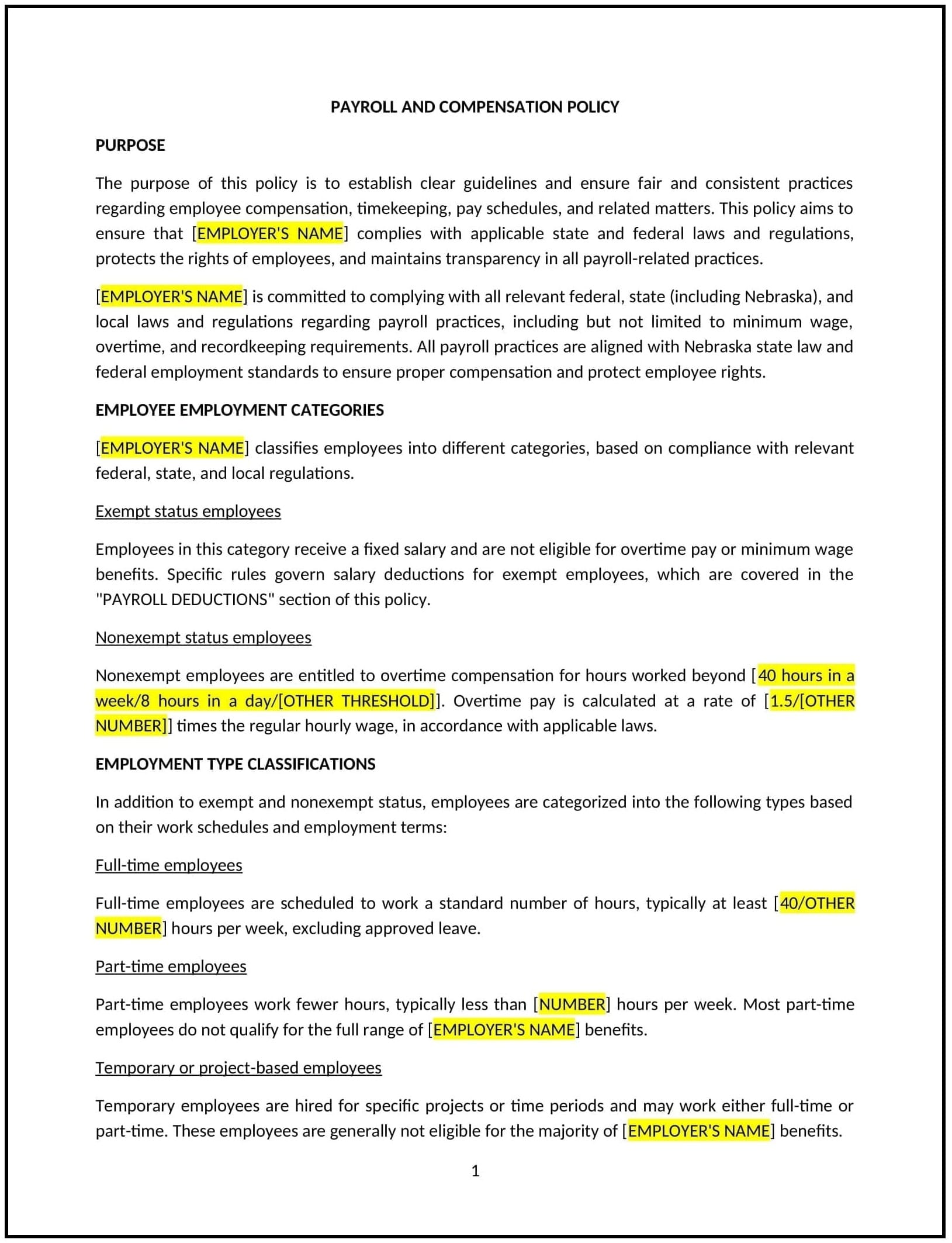Payroll and compensation policy (Nebraska): Free template
Got contracts to review? While you're here for policies, let Cobrief make contract review effortless—start your free review now.

Customize this template for free
Payroll and compensation policy (Nebraska)
A payroll and compensation policy helps Nebraska businesses establish clear guidelines for managing employee pay, benefits, and related processes. This policy is designed to ensure transparency, fairness, and consistency in how employees are compensated, while aligning with Nebraska’s labor laws and business environment. By formalizing payroll and compensation practices, businesses can build trust, reduce disputes, and support employee satisfaction.
By implementing this policy, businesses in Nebraska can streamline payroll processes, enhance employee morale, and demonstrate a commitment to fair and equitable compensation.
How to use this payroll and compensation policy (Nebraska)
- Define pay periods: Specify the frequency of pay periods, such as weekly, bi-weekly, or monthly, and outline the process for calculating hours worked.
- Establish compensation structure: Provide details on salary ranges, hourly wages, overtime rates, and any additional compensation, such as bonuses or commissions.
- Address deductions: Clearly explain mandatory and voluntary deductions, such as taxes, benefits, or retirement contributions.
- Outline payment methods: Specify how employees will receive their pay, such as direct deposit, paper checks, or pay cards.
- Set overtime guidelines: Define eligibility for overtime pay and how it is calculated in accordance with federal and Nebraska labor laws.
- Provide benefits information: Include details on employee benefits, such as health insurance, retirement plans, and paid time off.
- Communicate the policy: Share the policy with employees during onboarding and through internal communications to ensure awareness and understanding.
- Train payroll staff: Educate payroll administrators on the policy’s guidelines and ensure they are equipped to handle payroll processes accurately.
- Review and update the policy: Periodically assess the policy’s effectiveness and make adjustments as needed to reflect changes in laws, business needs, or employee feedback.
Benefits of using this payroll and compensation policy (Nebraska)
This policy offers several advantages for Nebraska businesses:
- Promotes transparency: Clear guidelines help employees understand how their pay is calculated and what deductions apply.
- Builds trust: A formal policy demonstrates the business’s commitment to fair and equitable compensation practices.
- Reduces disputes: Consistent payroll processes minimize the risk of errors or misunderstandings related to pay.
- Enhances employee satisfaction: Fair compensation and timely pay contribute to employee morale and retention.
- Aligns with Nebraska values: The policy reflects the state’s emphasis on fairness, accountability, and community support.
- Improves efficiency: Streamlined payroll processes save time and reduce administrative burdens.
- Supports legal compliance: Clear guidelines help businesses align with federal and Nebraska labor laws.
Tips for using this payroll and compensation policy (Nebraska)
- Communicate the policy effectively: Share the policy with employees during onboarding and through regular reminders, such as emails or training sessions.
- Provide training: Educate payroll administrators and managers on the policy’s guidelines to ensure accurate and consistent implementation.
- Use reliable payroll software: Invest in payroll software to automate calculations, deductions, and payment processing.
- Document payroll records: Maintain detailed records of employee pay, hours worked, and deductions to ensure accountability and compliance.
- Address employee concerns: Create a process for employees to raise questions or concerns about their pay and resolve them promptly.
- Review the policy periodically: Update the policy as needed to reflect changes in laws, business needs, or employee feedback.
- Lead by example: Ensure senior leadership adheres to the policy and demonstrates a commitment to fair compensation practices.